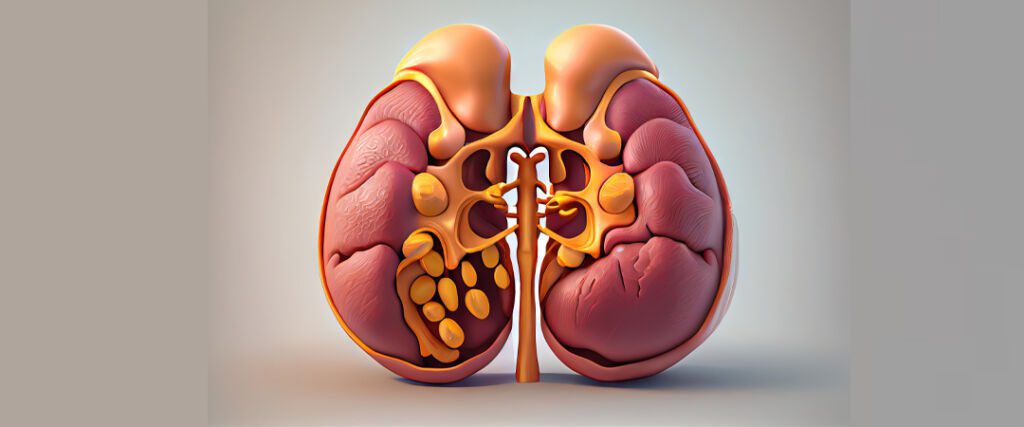
Have you ever wondered how your kidneys work and why they are so important for your health? In this article, we’re going to delve into the world of nephrology and find out everything you need to know about kidney disease.
Nephrology is a branch of medicine that focuses on the study and treatment of kidney disease. The kidneys are essential organs that filter and remove waste products from the blood, regulate the balance of fluids in the body and produce hormones that are important for overall health. If the kidneys don’t work properly, it can lead to serious health problems.
In this article, we will explain the causes of kidney disease, its symptoms, possible complications and available treatments. You will also learn how to prevent kidney disease and keep your kidneys healthy.
Join us for a deep dive into the fascinating world of nephrology and learn everything you need to know about these vital organs.
WHAT IS KIDNEY DISEASE?
Kidney disease is a condition that affects the function of the kidneys. When the kidneys are damaged, they cannot filter waste products from the blood properly, leading to a build-up of toxins in the body. There are different types of kidney disease, ranging from acute kidney failure to chronic kidney failure. Each type of kidney disease has its own specific causes and symptoms.
Kidney disease can be caused by a number of factors, including circulatory problems, kidney infections, autoimmune diseases, genetic disorders, the use of certain medications and underlying health problems such as diabetes and high blood pressure. It is important to understand the causes of kidney disease so that appropriate preventative measures can be taken.
TYPES OF KIDNEY DISEASE
There are several types of kidney disease, each with its own characteristics and symptoms. Here are some of the more common types:
Acute kidney failure: This form of kidney disease develops rapidly and can be caused by infection, toxic drugs, lack of blood supply to the kidneys or kidney stone problems. Symptoms include decreased urine production, abdominal pain, excessive tiredness and mental confusion.
Chronic kidney failure: This form of kidney disease develops gradually over several years. The main causes of chronic kidney failure are diabetes, high blood pressure and autoimmune kidney disease. Symptoms include persistent tiredness, back pain, loss of appetite and pale skin.
Nephritis: Nephritis is an inflammation of the kidneys that can be caused by a bacterial or viral infection, an autoimmune reaction or the use of certain drugs. Symptoms of nephritis include back pain, fever, bloody or cloudy urine and high blood pressure.

CAUSES AND RISK FACTORS FOR KIDNEY DISEASE
Kidney disease can be caused by a number of factors and underlying conditions. Here are some of the main causes and risk factors:
Diabetes: Diabetes is a major cause of kidney disease. If blood glucose levels are high over a long period of time, this can damage the small blood vessels in the kidneys, leading to reduced kidney function.
High blood pressure: Prolonged high blood pressure can also damage the blood vessels in the kidneys, leading to kidney problems.
Autoimmune diseases: Autoimmune diseases such as systemic lupus erythematosus can cause inflammation and damage to the kidneys.
Kidney infections: Kidney infections, such as pyelonephritis, can damage the kidneys and lead to long-term kidney problems if left untreated.
It is important to consider and manage these risk factors to prevent kidney disease.
SYMPTOMS AND SIGNS OF KIDNEY DISEASE
Kidney disease can cause a range of symptoms and signs, depending on the type and severity of the disease. Here are some common symptoms of kidney disease:
- Persistent tiredness and general weakness.
- Swelling of the legs, ankles and face.
- Loss of appetite and unintentional weight loss.
- Pain or burning when urinating.
- Blood in the urine or foamy urine.
- Persistent back pain
- High blood pressure.
If you experience any of these symptoms it is important to see a doctor for diagnosis and appropriate treatment.
DIAGNOSING KIDNEY DISEASE
Diagnosing kidney disease involves a number of steps, including blood tests, urinalysis, renal ultrasound scans and kidney biopsies. These tests help to assess kidney function, detect structural abnormalities and identify any underlying causes of kidney disease.
It is important to see a doctor as soon as symptoms appear or if you have risk factors for kidney disease so that you can get an accurate diagnosis and start appropriate treatment quickly.
TREATMENT OPTIONS FOR KIDNEY DISEASE
Treatment for kidney disease depends on the type and severity of the condition. Here are some of the common treatment options:
Medication: Certain medicines may be prescribed to treat the symptoms of kidney disease, control blood pressure, reduce inflammation, or prevent complications.
Dialysis: Dialysis is a treatment that replaces kidney function by removing waste products and excess fluid from the blood. There are two types of dialysis: peritoneal dialysis and haemodialysis.
Kidney transplant: Kidney transplantation may be considered for patients with end-stage renal failure. However, kidney transplantation is not always possible due to the shortage of available organs and strict compatibility criteria.
The choice of treatment depends on a number of factors, including the patient’s general health, the severity of the kidney disease and the availability of treatment options.

LIFESTYLE CHANGES AND PREVENTION OF KIDNEY DISEASE
The risk of kidney disease can be reduced by making certain lifestyle changes and taking preventive measures. Here are some useful tips:
Maintain healthy blood pressure: Keep your blood pressure under control by eating a healthy diet, exercising regularly and taking any prescribed medication.
Control your blood glucose: If you have diabetes, keep your blood glucose levels within recommended limits and follow your doctor’s advice.
Avoid smoking: Smoking is a risk factor for many diseases, including kidney disease. Quitting smoking can reduce your risk of kidney disease and improve your overall health.
Maintain a healthy weight: Maintain a healthy weight by eating a balanced diet and getting regular exercise. Being overweight can put extra pressure on your kidneys.
SUPPORT AND RESOURCES FOR PEOPLE WITH KIDNEY DISEASE
Appropriate support and resources are essential for people with kidney disease. Here are some of the services and resources available:
- Support groups: Support groups allow people with kidney disease to connect with others with similar experiences, share advice and get emotional support.
- Patient organisations: Patient groups are organisations that provide information, resources and advice to people with kidney disease.
- Education about the disease: It is important to learn about your disease and understand the different treatment options, possible complications and preventive measures.
- Regular medical check-ups: People with kidney disease should see their doctor regularly for check-ups and screening tests.
It is important to seek and use the resources available to effectively manage kidney disease and improve quality of life.
CONCLUSION: THE IMPORTANCE OF UNDERSTANDING NEPHROLOGY AND KIDNEY DISEASE
Understanding nephrology and kidney disease is essential to maintaining good health and preventing serious complications. The kidneys play a vital role in the human body and any change in their function can have a significant impact on overall health.
By understanding the causes, symptoms, treatment and prevention of kidney disease, you can take steps to protect your kidneys and maintain good kidney health.
Take care of your kidneys and see your doctor if you develop symptoms of kidney disease. With a good understanding of nephrology, you can take control of your kidney health and live a healthy, full life.

